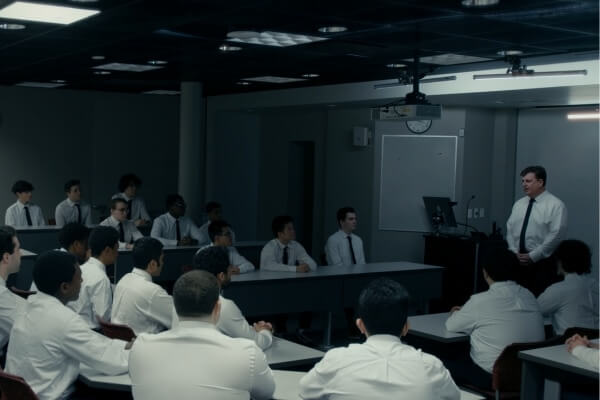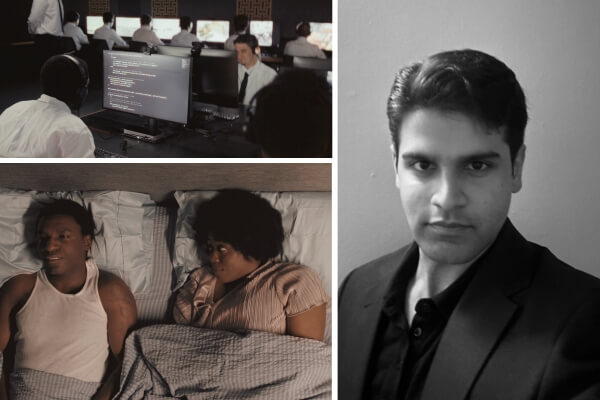Mophat Okinyi has been named one of TIME Magazine’s 100 Most Influential People in AI for 2024. A former content moderator, Nairobi-based Okinyi helped make Open AI’s ChatGPT a success. But that is not why he made to the coveted TIME list.
Instead, Okinyi earned the distinction for his courageous whistleblowing on the gruelling working conditions he and his colleagues endured at Sama – a company outsourced by OpenAI to read and label thousands of disturbing descriptions — ranging from child sexual abuse to extreme violence. Their work was essential in shaping the AI chatbot’s ability to filter out harmful content for its users.
Today, Okinyi is an AI and human rights activist, advocating for the fair treatment and rights of online content moderators, tech workers and data training professionals in Africa. His story has even inspired art, shaping the protagonist in Gradient Descent, a short film by Indian-origin filmmaker Vir Srinivas. Currently a film student at the University of Southern California, Srinivas’ film explores the mental health impact of content moderation, taking Okinyi’s experience and reimagining it in an American dystopian context.

The idea to make Gradient Descent came to Srinivas after he came across a TIME article alleging that OpenAI exploited Kenyan workers to enhance their generative models.
“I read that piece months after it was originally published in January 2023, and I was taken aback by the fact that I hadn’t heard about it before,” Srinivas tells Indian Link. “The entire concept for a short thriller soon came to me.”
The TIME investigation detailed how Sama paid its employees less than $2 an hour to label explicit image, video, audio, and text content including child sexual abuse, murder, suicide, torture, and self-harm. The job of these employees was to classify and filter out the toxic content from the training datasets of ChatGPT. It, however, left several employees psychologically traumatised.

“Okinyi stated that after consuming so much text detailing graphic sexual violence and rape, he began to have paranoid delusions about the people around him,” Srinivas shares. “As a result, his personal relationships suffered and his wife, pregnant at the time, left him. Okinyi was not an isolated case and while specifics still seem to be lacking, a lot of the underpaid Kenyan workers developed mental health problems following their work.”
Exploitation that powers AI
Vir Srinivas’ Gradient Descent is a 20-minute short film that is currently being considered for several film festivals.
Given the sensitive nature of the content involved (e.g., child abuse, violence), Srinivas has been careful in showing his audience only what they can consume.
“Much of the horrific content the workers are consuming in my film is implied rather than explicitly shown [in the film],” he explains. “I was interested more in the content’s effect than its matter.”

The young filmmaker chose to relocate the setting from Kenya to American metropolis. “Because I wanted to make a work of dystopic fiction,” Srinivas quickly adds. “I had to consider who this nefarious AI corporation in the US would recruit and how they would conceal their unethical operations from the public and the government.”
This shift in setting allowed Srinivas to explore how such exploitation could occur in a Western context.
The story follows a homeless American man who is recruited by a fictional, nefarious version of an artificial intelligence corporation, to do content moderation. The job takes a traumatic toll on his mental health and the film follows his journey in attempting to expose the company’s unethical practices.
Logistically speaking, Srinivas says, this has been his most challenging shoot to date.

“Certain scenes involved the use of about 50 extras and the film spanned multiple locations including a penthouse, rooftop, street, and a computer lab,” he recalls. “There was a really tough day where we shot outside in heavy rain and wind during the Boston winter without any cover, but I was fortunate enough to have a remarkable team behind me committed to making this film happen one way or another.”
Filmmaking prowess
Srinivas is no stranger to ambitious storytelling. The 23-year-old wrote his debut feature, Orders From Above, when he was just 19. That project won three categories, including Best History Film, at the Cannes World Film Festival.
The 87-minute film is based on the interrogation of Nazi war criminal Adolf Eichmann by Israeli police.
While his debut feature dealt with war crimes, his latest tackles the ethics of AI exploitation. We ask if his experience from the previous film influenced his approach to making Gradient Descent.
View this post on Instagram
“I don’t think about my previous films when I’m making a new one. In fact, I don’t learn anything by making my own films. I learn by watching the films of others,” he confesses.
AI is often discussed in terms of its future potential and dangers. However, Srinivas was inspired to undertake this cinematic endeavour because few, even now, are aware of its exploitative past.
“It is concerning that we seem to readily accept new technologies without considering its origins or effects. I am no expert on AI, but it looks to me like no one knows how it’s going to impact our society in the long term. The only certainty is uncertainty,” he shares.
When asked how he wishes his audience to respond to such a heavy yet significant subject, Vir Srinivas simply says: “I just hope the audiences will be entertained.”
Read more: Vir Srinivas, 20, wins at Cannes with debut film Orders From Above





